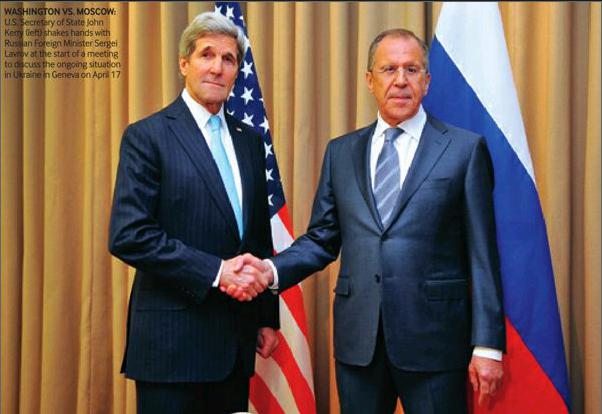A Fragile Foursome
2014-05-27ByDingYing
By+Ding+Ying

Most ceasefire treaties are made to be broken—the only question is when. A four-way agreement reached by parties most closely involved with the Ukrainian crisis falls short of a treaty, suggesting a serious weakness. While the agreement may be short-lived, the crisis and related fallout are likely to last for years.
A fragile deal
The crisis was temporarily tempered with the four-way agreement signed by the United States, the European Union (EU), Russia and Ukraine that calls on all sides to de-escalate tensions in Ukraine on April 17 in Geneva. The agreement will not end conflicts in Ukraine, but it shows that both the Kremlin and the White House hope to avoid deteriorating the regional situation.
“Neither Russia, nor the West, wants to stir up trouble,” said Xia Yishan, a senior research fellow with the China Institute of International Studies (CIIS).
The agreement requires all sides to refrain from violence, intimidation or provocative actions. It also promises amnesty to protesters after they pull out of occupied government buildings and surrender their weapons. The Ukrainian Government has agreed to conduct “inclusive and transparent and accountable” discussions for amending the Constitution and protecting minoritiesrights, while carrying out a “broad national dialogue” ahead of the presidential election on May 25.
“The agreement put forth lacks teeth. It does not rigorously clarify terms of disarmament and constitutional amendment,”explained Xia. Moreover, while the related parties agreed on establishing a federal mechanism in Ukraine, the details are still uncertain, he added.
Qu Xing, President of the CIIS, pointed out that such an agreement is the result of one-on-one negotiations between Moscow and the West. The United States and the EU are on the side of the Ukrainian Government, which cannot claim decisive rights of the negotiations.
Qu said that the agreement reflected the two sides shared goal of bringing the situation under control. Russian President Vladimir Putin is aware that the West will not tolerate further separation of Ukraine because it would eliminate the buffer zone between Russia and the EU. At the same time, the United States and the EU have little leverage to engage Moscow.
Qu said the West will not take military action against Russia. Furthermore, economic sanctions against Russia will hurt the EU, which relies on Russian natural gas. Politically and diplomatically, the United States and the EU will not be able to pass any UN decision with legal effect, as Russia owns the right to veto as a permanent member state of the UN Security Council.endprint
Gaining Crimea is enough to satisfy Russias appetite, argued Xia, while the U.S.-headed West is preoccupied with U.S. President Barack Obamas “pivot to Asia”strategy. “Clearly, Washington feels more threatened by Beijing than Moscow,” he said. According to the result of a referendum held on March 16 in Crimea, more than 96 percent of the voters approved the motion of Crimea joining the Russian Federation. Five days later, Putin signed two documents, accepting Crimea and the city of Sevastopol as members of the federation.
Obama and Putin are not optimistic about the future of the four-way agreement. Right after the deal, Obama said that in light of past experiences, he feared Putin would not obey the terms. He said that according to his agreement with German Chancellor Angela Merkel, once agreed common understandings fails to be implemented in time, they will adopt further measures. The United States is ready to respond to Russia, but military action will not be included, said Obama. Washington announced on April 17 that it would provide military assistance to Ukraine and deepen defense cooperation with Poland to cope with the Ukrainian crisis.
Putins attitude is similar. He admitted that no promises could be made, but added that diplomatic channels could ease the current tensions.
A turbulent nation
Many cities in east Ukraine broke out in demonstrations after Crimeas referendum, protesting their leaving Ukraine and joining Russia. There is no sign of the domestic situation calming down.
The upcoming presidential election is unlikely to act as a silver bullet to bring the crisis to an end.
Qu said that managing ethnic conflicts in Ukraine is challenging for historical reasons. The government will face a tough task in relieving poverty, which is the root cause of peoples dissatisfaction. Besides, Qu added, if the new government cannot sustain the sensitive balance between Russia and the West, political crises could ignite at any moment.
Xia believes that the ongoing conflicts have shown that neither Russia nor the West can fully control Ukraine.
“Stability in Ukraine will depend on solving two major problems: whether future reform will satisfy demands of eastern Ukrainian cities; and whether the national economy can improve,”Xia stressed.
Demanding the economically stagnant Ukraine pay its gas bills owed to Russia, Putin threatened to cut off the countrys supply unless advance payment is made. The Russian president asked EU nations on April 19 to offer a helping hand to Ukraine, so as to guarantee a normal gas supply to Europe, which will be sent via pipelines through Ukraine. Putin said that Moscow has no intention of crashing Ukraines economy, or disrupting natural gas and oil supplies to Europe. This move had no connection with Ukraines political process and coming election, he claimed.endprint
“Of course, debt should be paid. The West has no reason to refute Russias request,” said Xia. “Once the pipelines are shut down, Europe will also have an energy crisis.”
Ukrainian Finance Minister Alexander Shlapak applied for foreign assistance to get through the current difficulty. “Our task is to borrow at least $9 billion on foreign markets to ease the pressure on the countrys foreign exchange reserves,” Shlapak said on April 18, promising the Ukrainian Government will do its best to fulfill Kievs debt obligations.
Apart from its expensive energy bills, the Ukrainian economy is facing bankruptcy over high budget deficits, huge state debt and low foreign exchange reserves, which dropped in March to $15.08 billion, the lowest level ever. According to the finance minister, the government is negotiating a loan between $14 billion and $18 billion from the International Monetary Fund, which could also unlock financial help from other international lenders in order to keep the Ukrainian economy afloat.
Xia said that Western countries will not give much international help to Ukraine as their economies are not strong enough to do that.“A $10-20 billion loan will not solve Ukraines economic and financial problems,” Xia said.
However, he said, Moscows target is not to swallow up more east Ukrainian cities, but to press the Ukrainian Government and the West to accept east Ukraines claims for more rights of autonomy and the adoption of Russian as an official language.
“All elements in the crisis—the EU and Washingtons policy, Russias attitude and domestic situation of Ukraine—are changing, which makes the whole situation very challenging,” said Xia.
A fragile agreement cannot contain the players, but a common demand to control the regional situation can. As both Washington and Moscow are unprepared for direction confrontation, the Ukrainian crisis will remain a game of chicken.endprint
